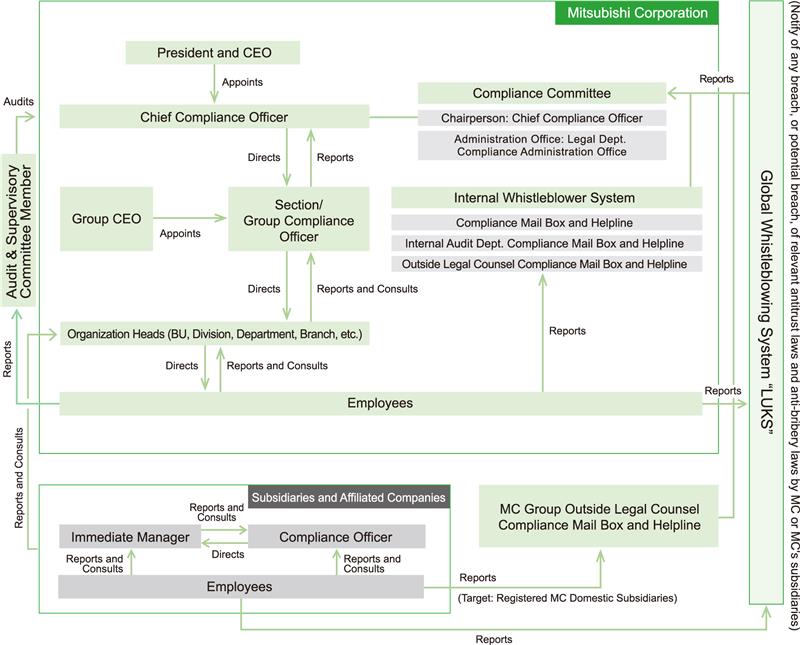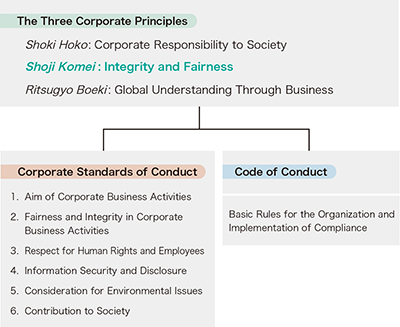Compliance: Structure
Structure
Investigations of Compliance Violations and Response Systems
Compliance Framework
At MC, the Compliance Committee and Compliance Officer systems play important roles in implementing compliance programs. Acting as an advisory body to the Chief Compliance Officer, the Compliance Committee reports on and discusses major compliance incidents within MC, ensuring appropriate measures are communicated and enforced. The Committee, chaired by the Chief Compliance Officer, who is appointed by the President and CEO), and meetings are held twice a year in principle. Matters discussed by the Committee are reported to the Executive Committee and the Board of Directors annually. The Chief Compliance Officer oversees all compliance matters across MC and is responsible for planning and implementing compliance programs. The Chief Compliance Officer also has the authority to conduct investigations in the event of an actual or potential breach and may order the suspension or modification of business activities to prevent or remedy such breaches. In addition, MC appoints senior executives in the corporate section and each Business Group at the Head Office as Compliance Officers. Each officer implements compliance programs tailored to their respective section or Business Group. Under the Chief Compliance Officer’s supervision, these officers—who are management executives— take measures to prevent recurrence of violations and are responsible for promoting ethical conduct and preventing bribery and corruption
Compliance Framework

Response Systems for Individual Cases
Officers and employees of MC are required to report to or consult with their superiors, managers, or other relevant personnel, including compliance staff, if they become aware of a breach or potential breach of compliance. Managers of organizational bodies must then report to or consult with the Compliance Officer of their section or Business Group, who is then required to report to the Chief Compliance Officer. Cases of violations and the status of resolutions reported to the Chief Compliance Officer, including those from subsidiaries, are also reported to Audit & Supervisory Committee Members. The relevant Compliance Officer must conduct necessary investigations with due care to avoid infringing on the human rights and dignity of concerned parties and will formulate and implement preventive measures and remedies. The results of investigations and the measures implemented are reported to the Chief Compliance Officer and used to plan and improve compliance programs for MC as lessons learned.
In addition, MC has a dedicated organization within the Legal Department called the "Administration Office for the Compliance Committee" which supports the Chief Compliance Officer in handling compliance cases and in planning and implementing MC compliance programs in cooperation with each Compliance Officer and relevant departments.
Internal Rules and Regulations
MC’s core philosophy is the Three Corporate Principles. Beneath this are the Corporate Standards of Conduct, which govern MC as a company, and the Code of Conduct for Executives and Employees, which applies to each executive and employee. The Code of Conduct's basic philosophy is expressed as follows: "In conducting business, MC executives and employees shall comply with laws and regulations, international agreements, and internal rules, observe business manners, and act responsibly in accordance with social norms." At MC, compliance is not limited to simply complying with laws; it is also based on the principle that any action that violates social norms—even if it is not illegal—should not be undertaken.
To promote the Code of Conduct internally, MC prints it in the Pocket Employee Handbook and publishes it for officers and employees to reference. In addition to specific points to uphold, instructions on accessing the Meyasubako (Compliance Mailbox and Helpline) for compliance consultations are included so officers and employees can refer to them whenever necessary. Furthermore, an annual e-learning program featuring case studies related to the Code of Conduct is conducted. At the end of the program, all officers and employees submit a written pledge affirming their commitment to comply with the Code.

To maintain an effective compliance program and ensure accessibility to MC's compliance philosophy and rules, MC has established various compliance-related internal regulations under the Three Corporate Principles, the Corporate Standards of Conduct, and the Code of Conduct. These internal regulations are reviewed annually to reflect amendments to laws and regulations, as well as changes in the business environment and other relevant conditions.
Major internal rules and regulations relating to compliance include:
- Basic Rules for the Organization and Implementation of Compliance
- Standard for Internal Reporting
- Security Trade Control Rules and Regulations
- Standard for Sanction Management
- Trade Procedure Management Standards
- Standard for the Prevention of Cartels
- Standard for Transaction Pursuant to the Law on the Prevention of Delays in the Payment of Subconstracting Charges
- Standards for the Prevention of Unfair Stock Trading
- Code of Prohibition against Improper Payments or Other Types of Benefits
- Standard for Entertainment
- Standard for the Management of Antique Trading
- Permission Approval and Notification Management Standards
- Standard for the Management of Chemical Substances
- Consumer Products Import and Sales Standards
Monitoring System
Monitoring of Individual Cases
All reports regarding the facts, causes and preventive measures or remedies for each compliance incident are shared with the Administration Office for the Compliance Committee. These reports are used for case analyses, risk assessment, and planning compliance programs and measures.
Employee Awareness Survey
We view employee engagement as the most important factor in developing a dynamic, spirited, and vibrant talent pool and organization through human resource policies aligned with our management strategies. In line with this philosophy, MC began conducting an annual Employee Awareness Survey in FY2022 to regularly monitor and enhance organizational culture, including the culture of compliance. One of MC’s KPIs is maintaining positive response rates of at least 65% for both employee engagement and employee enablement in the survey. Employees receive feedback on survey results to help them make improvements within their own organizations. At the management level, we analyze and discuss these results, identify company-wide issues, and incorporate findings into policies. For example, since FY2023, MC has implemented company-wide business process reforms based on survey analysis to improve efficiency and raise productivity. These reforms aim to create business environments where human resources can focus on value- creation activities.
Responses to Risk Factors by Each Business
MC conducts periodic self-assessments of compliance risks that require special attention for each of its businesses and subsidiaries, such as risks relating to anti-trust violations, bribery and corruption, and occupational health and safety, taking into account industry, product, and regional characteristics. Compliance Officers of each Business Group analyze risk factors specific to their Group and implement appropriate risk response measures. Each subsidiary also appoints a person responsible for compliance matters (i.e. Compliance Officer of subsidiaries), who analyzes risk factors for their respective business areas and implements risk response measures.
PDCA Cycle
Utilizing the PDCA cycle, MC implements necessary measures, such as conducting seminars and adopting regulations, to address compliance risks identified through surveys, reports, and monitoring, while considering input from Compliance Officers of each Business Group. Results are monitored and analyzed, and findings are reflected in further risk identification and evaluation. The goal is to improve compliance awareness and knowledge among all officers and employees through repeated and rigorous education and training.
